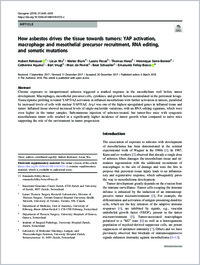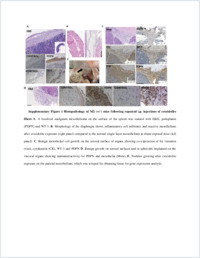How asbestos drives the tissue towards tumors: YAP activation, macrophage and mesothelial precursor recruitment, RNA editing, and somatic mutations
- Rehrauer, Hubert Functional Genomics Center Zurich, ETH Zurich and University of Zurich, Switzerland
- Wu, Licun Latner Thoracic Surgery Research Laboratories, University of Toronto, Canada
- Blum, Walter Department of Medicine, Unit of Anatomy, University of Fribourg, Switzerland
- Pecze, László Department of Medicine, Unit of Anatomy, University of Fribourg, Switzerland
- Henzi, Thomas Department of Medicine, Unit of Anatomy, University of Fribourg, Switzerland
- Serre-Beinier, Véronique Department of Thoracic Surgery, University Hospitals of Geneva, Switzerland
- Aquino, Catherine Functional Genomics Center Zurich, ETH Zurich and University of Zurich, Switzerland
- Vrugt, Bart Institute of Surgical Pathology, University Hospital Zurich, Switzerland
- Perrot, Marc de Laboratory of Molecular Oncology, University Hospital Zürich, Switzerland
- Schwaller, Beat Department of Medicine, Unit of Anatomy, University of Fribourg, Switzerland
- Felley-Bosco, Emanuela Laboratory of Molecular Oncology, University Hospital Zürich, Switzerland
-
05.03.2018
Published in:
- Oncogene. - 2018, vol. 37, no. 20, p. 2645–2659
English
Chronic exposure to intraperitoneal asbestos triggered a marked response in the mesothelium well before tumor development. Macrophages, mesothelial precursor cells, cytokines, and growth factors accumulated in the peritoneal lavage. Transcriptome profiling revealed YAP/TAZ activation in inflamed mesothelium with further activation in tumors, paralleled by increased levels of cells with nuclear YAP/TAZ. Arg1 was one of the highest upregulated genes in inflamed tissue and tumor. Inflamed tissue showed increased levels of single-nucleotide variations, with an RNA-editing signature, which were even higher in the tumor samples. Subcutaneous injection of asbestos-treated, but tumor-free mice with syngeneic mesothelioma tumor cells resulted in a significantly higher incidence of tumor growth when compared to naïve mice supporting the role of the environment in tumor progression.
- Faculty
- Faculté des sciences et de médecine
- Department
- Département de Médecine
- Language
-
- English
- Classification
- Biological sciences
- License
-
License undefined
- Identifiers
-
- RERO DOC 309528
- DOI 10.1038/s41388-018-0153-z
- Persistent URL
- https://folia.unifr.ch/unifr/documents/306750
Other files
Statistics
Document views: 170
File downloads:
- pdf: 240
- Supplementary material: 149

